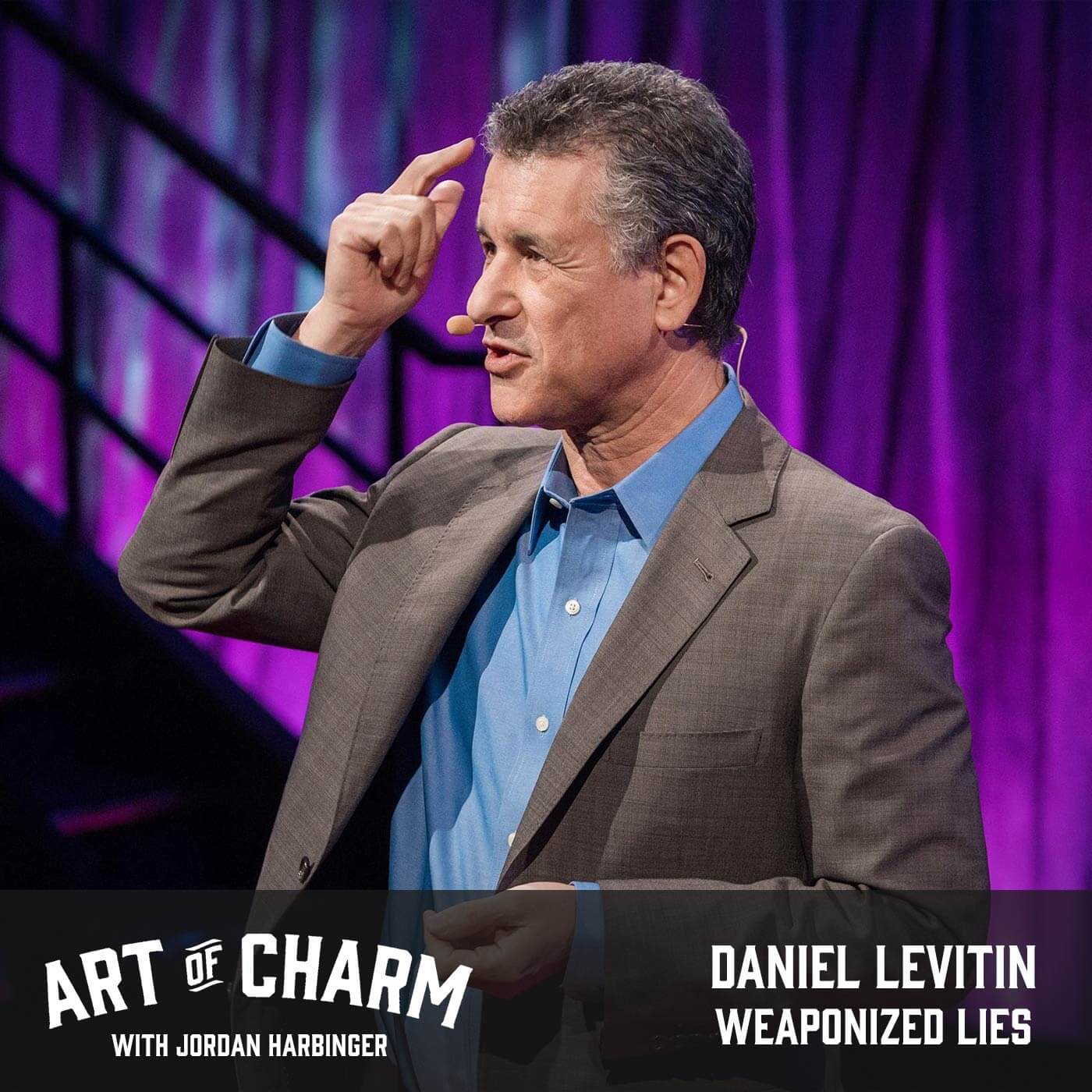Daniel Levitin (@danlevitin) is a cognitive psychologist, neuroscientist, musician, record producer, and author of Weaponized Lies: How to Think Critically in the Post-Truth Era.
“Your brain clings tenaciously to beliefs that it’s held, even when the evidence has been found to be bogus or untrue.” -Daniel Levitin
The Cheat Sheet:
- The most important quality for anyone who wants to be an evidence-based, critical thinker.
- Why even society’s smartest people fall victim to misinformation.
- The first step to making good decisions.
- How to dismantle bad arguments on the fly.
- Why we need to look beyond averages when making a case.
- And so much more…
[aoc-subscribe]
In this age of information overload, it’s increasingly difficult to separate actual facts from manufactured and manipulative fictions designed to sway our everyday choices. But critical thinking is a toolkit we can learn to develop in order to make sound and effective decisions at home and at work about everything from finances to science to health care and beyond.
Our guest today is cognitive psychologist and neuroscientist Daniel Levitin, who explains he wrote Weaponized Lies: How to Think Critically in the Post-Truth Era “to help everyone make better decisions and to think more effectively about the information they encounter in day-to-day life.” Listen, learn, and enjoy!
More About This Show
Imagine your daily intake of information as an endless supply of side dishes at a buffet table that stretches from horizon to horizon. Some of these dishes are filled with nutritionally stable nuggets of truth, while others are piled high with toxic but tantalizing morsels of half-truths, quarter-truths, and outright lies. Choosing what to consume can be challenging even when we know the difference, but all too many of us step up to the buffet table blindfolded and expect to come away as nourished as someone who carefully curates every bite consumed.
If we’re not choosing what information we consume, it’s being chosen for us — often by parties who aren’t considering what’s best for us, but only in furthering their own financial, political, or personal agendas. For cognitive psychologist and neuroscientist Daniel Levitin, author of Weaponized Lies: How to Think Critically in the Post-Truth Era, critical thinking is the toolkit we need to develop if we really want to be in control of our own lives.
How often do we fall for claims that seem sound on the surface, but fall apart upon further examination? Take for example a commercial that boldly makes the claim that one particular toothpaste is recommended by four out of five dentists.
“If you’re a critical thinker, there are a number of questions you’d want to ask here,” says Daniel. “Like, who are these dentists? Do they still have their medical licenses? Are they getting money from [the toothpaste company]? How many dentists did they ask? Did they literally just ask five, or did they ask 500 and 400 recommended [this brand]? This matters. More to the point, you might want to know what question would a dentist be able to answer, given a dentist’s expertise. I’ve been going to a dentist all my life; my dentist has never asked me what toothpaste I use. He doesn’t keep track.”
Without knowing the details of whatever source is being cited here, we have no way of knowing if a scientifically controlled study was done to back up the claim. We have no way of knowing if the data supporting the claim is even relevant to the conclusion. And we have no way of knowing how many of the alleged dentists polled have a propensity for spouting failed or pseudo-expertise.
“The fact is, expertise has become increasingly narrow in the last 30 or 40 years,” says Daniel. “There’s so much information that we’ve created as a society; by Google’s own estimate, we’ve created as much information in the last five years as in all of human history before it. And so if you’re a biologist or a cancer doctor or a specialist on Chinese art or a political pundit, an economist, if you want to maintain a foothold of expertise in your area, it’s going to tend to be narrow.
“You’d be hard-pressed to find somebody who is expert in ‘The Law.’ They’re going to be expert in constitutional law or torts or criminal law. And even within criminal law, they might be expert in murder, but not in robbery. Expertise tends to be narrow. So I find this most often irritating with scientists who start talking outside of their domain.”
Daniel brings up the case of Sally Clark, a woman in the UK who was wrongfully convicted of murder when each of her two children died of sudden infant death syndrome just a few years apart. Flawed statistical evidence presented by a pediatrician in court showcased the chance of these two deaths by natural causes as one in 73 million. The math used to arrive at this conclusion was found erroneous by The Royal Statistical Society and, together with accidentally omitted information from the forensic report, Sally Clark’s conviction was overturned — but the damage was done. She spent three years in prison on the faulty testimony of an unqualified “expert” and later drank herself to death as a result of psychiatric problems developed from the ordeal.
Listen to this episode of The Art of Charm to learn more about the pervasiveness of pseudo-expertise, why even educated people succumb to quackery, why it’s important to remember that correlation does not imply causation, why we shouldn’t feel dumb if we can’t wrap our heads around statistics (but how we can train ourselves to be better), where to find superb examples of misleading graphs in abundance, how a Mark Twain quote that ain’t so gets passed around among people who should know better (Daniel included), how Nicolas Cage movies correlate with people who drown in swimming pools, the importance of arguing against our own point of view, and lots more.
THANKS, DANIEL LEVITIN!
If you enjoyed this session with Daniel Levitin, let him know by clicking on the link below and sending him a quick shout out at Twitter:
Click here to thank Daniel Levitin at Twitter!
Click here to let Jordan know about your number one takeaway from this episode!
Resources from This Episode:
- Transcript for Daniel Levitin | Weaponized Lies (Episode 641)
- Weaponized Lies: How to Think Critically in the Post-Truth Era by Daniel J. Levitin
- The Organized Mind: Thinking Straight in the Age of Information Overload by Daniel J. Levitin
- Daniel Levitin’s website
- Daniel Levitin at Twitter
- Sally Clark is Wrongly Convicted of Murdering Her Children by Kevin B. Korb, Bayesians Without Borders
- The Crash and Burn of an Autism Guru by Susan Dominus, The New York Times Magazine
- The Undoing Project: A Friendship That Changed Our Minds by Michael Lewis
- Michael Shermer | Why We Believe Weird Things (Episode 531)
- Sam Harris | The Anti-Trump (Episode 514)
- Trump’s ‘Dangerous Disability’? It’s the Dunning-Kruger Effect by Faye Flam, Bloomberg View
- The Big Short
- An Inconvenient Truth
- The 5 Elements of Effective Thinking by Edward B. Burger and Michael Starbird
- Jonah Ryan on Veep
- Snopes
- PolitiFact
You’ll Also Like:
- The Art of Charm Challenge (click here or text AOC to 38470 in the US)
- The Art of Charm Bootcamps
- Elite Human Dynamics
- Best of The Art of Charm Podcast
- The Art of Charm Toolbox
- The Art of Charm Toolbox for Women
- Find out more about the team who makes The Art of Charm podcast here!
On your phone? Click here to write us a well-deserved iTunes review and help us outrank the riffraff!




